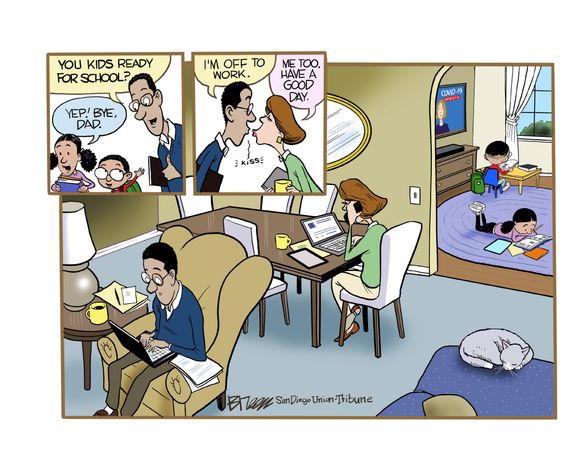Admiral Rockwell Tory
Diamond Member
I have said that unless we wrest control of education back from the Democrat/Liberal government schools, as earlier Republicans pried their slaves away from them, the nation has no future.
But....I couldn't see any possible way to do this........
BUT......
"Coronavirus has parents looking at homeschooling
With the COVID-19 virus closing schools in China, South Korea, Italy, and the United States, parents are having to make a sudden and unexpected change in their children’s education. Most often, it means shifting education into the home.
This learning at home looks different in different places. In Hong Kong, the government ordered 800,000 students to take what the Wall Street Journal calls “a crash course in digital learning.”
In New York City, parents are already seeking out homeschooling resources that fit their children and their families in preparation for any school closings.
The freedom of parents to choose the kind of education that’s best for each child is something we’ve been advocating for more than 35 years.
Homeschool grads go to college, join the military, launch their own businesses, and start families. They serve in soup kitchens, run for office, fight fires, and give back to their communities in many other ways.
In fact, more than 1.7 million students are homeschooling in the U.S., according to the National Center for Education Statistics.If both parents are working, it is still possible to make homeschooling work through options such as alternating work schedules or one parent working from home. It takes creativity, commitment, and even saying, “No,” to some opportunities. But without the restriction of a traditional school-day schedule, families are able to carve out time together and even flex their homeschool schedule along with variable work schedules (such as healthcare providers or cross-country transport)."
Coronavirus has parents looking at homeschooling
I think Home Schooling is a great idea!
You can teach your kids to hate liberals and democrats and gays and atheists
and I'll teach MY kids that people like you are dangerously deranged lunatics who sould be shunned, avoided and discriminated against in the name of DIVERSITY and TOLERANCE!
I truly hope whatever you want to do to liberals happens to YOU first!
Did you know that home school students surpass government school students by every metric?
Did you know that?
Bet you wish you had parents who loved you enough to home school you, huh?I have said that unless we wrest control of education back from the Democrat/Liberal government schools, as earlier Republicans pried their slaves away from them, the nation has no future.
But....I couldn't see any possible way to do this........
BUT......
"Coronavirus has parents looking at homeschooling
With the COVID-19 virus closing schools in China, South Korea, Italy, and the United States, parents are having to make a sudden and unexpected change in their children’s education. Most often, it means shifting education into the home.
This learning at home looks different in different places. In Hong Kong, the government ordered 800,000 students to take what the Wall Street Journal calls “a crash course in digital learning.”
In New York City, parents are already seeking out homeschooling resources that fit their children and their families in preparation for any school closings.
The freedom of parents to choose the kind of education that’s best for each child is something we’ve been advocating for more than 35 years.
Homeschool grads go to college, join the military, launch their own businesses, and start families. They serve in soup kitchens, run for office, fight fires, and give back to their communities in many other ways.
In fact, more than 1.7 million students are homeschooling in the U.S., according to the National Center for Education Statistics.If both parents are working, it is still possible to make homeschooling work through options such as alternating work schedules or one parent working from home. It takes creativity, commitment, and even saying, “No,” to some opportunities. But without the restriction of a traditional school-day schedule, families are able to carve out time together and even flex their homeschool schedule along with variable work schedules (such as healthcare providers or cross-country transport)."
Coronavirus has parents looking at homeschooling
I think Home Schooling is a great idea!
You can teach your kids to hate liberals and democrats and gays and atheists
and I'll teach MY kids that people like you are dangerously deranged lunatics who sould be shunned, avoided and discriminated against in the name of DIVERSITY and TOLERANCE!
I truly hope whatever you want to do to liberals happens to YOU first!
Did you know that home school students surpass government school students by every metric?
Did you know that?
Bet you wish you had parents who loved you enough to home school you, huh?
Really? How do you know home school students surpass government schools by every metric?
Let me guess! The HSLDA told you that and you believed it!
You don't believe it?
Figures......you've denied every fact and reality I've documented.
Please get lost.
Really? Where is the fact in that post? You have documented NOTHING to support your claim.




